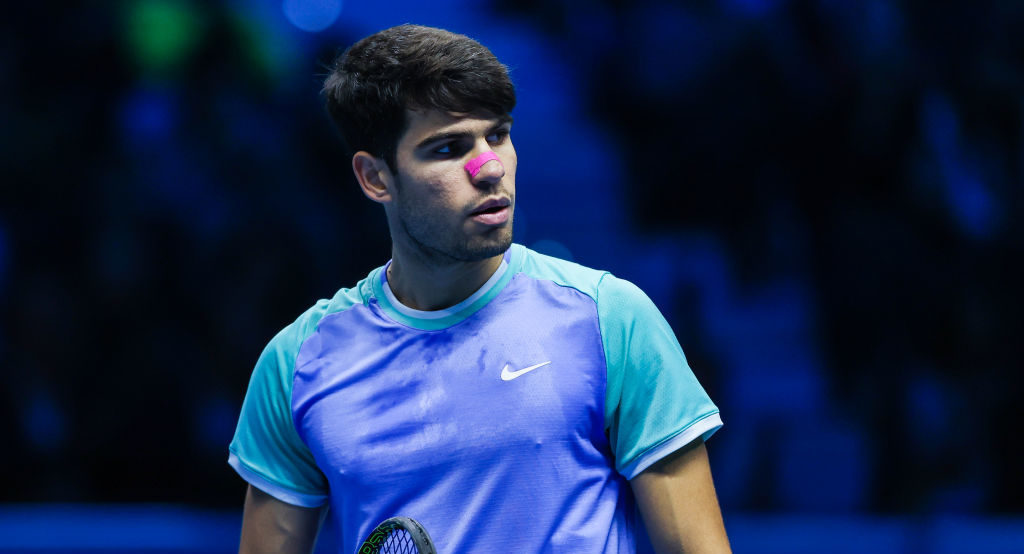
Carlos Alcaraz has been battling through more than just fierce competition at this year’s ATP Finals in Turin—he’s been fighting respiratory issues as well. The 21-year-old Spaniard, widely regarded as one of the brightest stars in tennis, has faced health challenges even before arriving at the season-ending tournament. This manifested in his opening match against Casper Ruud, where Alcaraz suffered his first-ever loss to the Norwegian. With a critical match against Andrey Rublev looming, there were genuine concerns about his physical readiness, particularly after cutting a practice session short due to his condition.
To aid his breathing, Alcaraz opted to sport a nasal band during his clash with Rublev. The device, more commonly seen in sports for improving airflow through the nostrils, made a noticeable difference in his performance. Facing a must-win situation to keep his hopes of advancing to the semifinals alive, Alcaraz delivered a determined and impressive display, securing a straight-sets victory over the Russian. The triumph was not without its tense moments. After trailing 2-3 in the first set, Alcaraz raised his game, winning four consecutive games to take the opener. In the second set, both players showcased strong service games, pushing the set to a tiebreaker. In a thrilling conclusion, Alcaraz saved two set points before clinching the match.
Reflecting on his victory, Alcaraz credited the nasal band for making a tangible difference. “I know [Nicolas] Jarry wears that thing on the nose. For me, it helped a lot today. I could breathe much better,” Alcaraz said in his post-match press conference. He expressed uncertainty about whether he would continue to use the device long-term, but acknowledged its immediate benefits. “In the situation that I am in right now, it helped a lot. I am pretty sure in the next match I am going to wear it. I felt better and could recover better between points. It is for that, to breathe a bit better.”
Alcaraz’s use of the nasal band raised questions about whether it would become a regular feature of his on-court attire. While he seemed open to the idea, recent updates have hinted otherwise. Sky Sports commentator Laura Robson noted that Alcaraz was seen training on Thursday morning without the nasal band, suggesting he might be feeling significantly better. If so, it could signal a return to peak form for the world No. 3 as the tournament progresses. Nevertheless, whether he continues to use the band or not, Alcaraz’s performance against Rublev demonstrated his resilience and adaptability, characteristics that have made him such a formidable force on the tour.
The path forward for Alcaraz is anything but easy. He will next face Germany’s Alexander Zverev in what promises to be a high-stakes encounter. Zverev has been on a tear recently, riding a seven-match winning streak that includes a title at the Paris Masters. Alcaraz knows that a victory will demand his absolute best, both physically and mentally. The German’s power, precision, and momentum present a formidable challenge, but if Alcaraz can summon the same grit he displayed against Rublev—and leverage any tactical or physical advantages, including improved breathing—he has a fighting chance.
The Spaniard’s health struggles have put his endurance and focus to the test, but overcoming such hurdles is not new to him. At just 21, Alcaraz has already demonstrated a maturity and mental toughness that belies his years. These qualities were on full display earlier this season when he captured two Major titles, cementing his status as one of the sport’s elite. However, the ATP Finals have presented a unique challenge—a blend of physical demands, elite competition, and the added complication of respiratory issues.
Alcaraz’s journey at this year’s Finals also sheds light on the pressures and expectations faced by the sport’s top players. Every match, every rally, and every decision is scrutinized, with fans and analysts eager to dissect both the triumphs and struggles of these elite athletes. In Turin, Alcaraz’s willingness to adapt, his candidness about his health, and his determination to fight through adversity have endeared him even more to his supporters and earned respect from his peers.
As Alcaraz prepares for his next test against Zverev, one can only hope that he continues to recover and regain his top form. His battle against respiratory issues adds an element of uncertainty to his performances, but it also underscores his dedication to competing at the highest level. Whether or not he continues to use the nasal band beyond this tournament, Alcaraz’s resilience, skill, and fighting spirit ensure that he will remain a key figure in men’s tennis for years to come. As the ATP Finals unfold, fans around the world will be watching to see how far he can go—and whether his journey through adversity will culminate in yet another remarkable achievement.
Leave a Reply